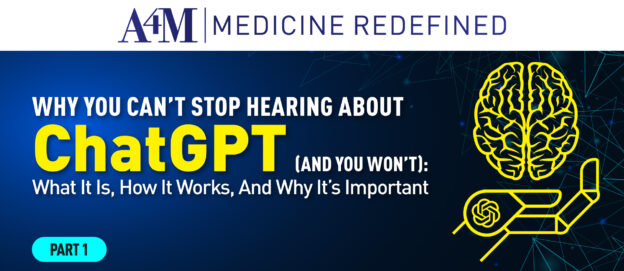The future of healthcare is rapidly evolving, and technology plays a major role in shaping it. From wearables to sensors, nanobots to chatbots, the use of artificial intelligence (AI) is becoming increasingly prevalent in the healthcare industry.
These technologies allow for the collection and utilization of data from a growing number of sources, including those used by consumers, practitioners, and health care systems; and this is what makes AI uniquely well-positioned to envelop medicine.
As LongevityFest 2022 faculty member and renowned innovator Peter Diamandis, MD underscored during his keynote presentation: the ever-growing role of AI in the future of medicine is undeniable, and no field will be left untouched.
Enter: ChatGPT
A prime current example of AI’s widespread adoption (or infiltration depending on point-of-view) is ChatGPT, the powerful chatbot made available to the general public through a free, easy-to-use web interface.
First launched in November 2022 by OpenAI, a leading AI research and deployment company, the chatbot has taken the world by storm. ChatGPT broke all records by attracting over 1 million users within one week of its launch, and its popularity shows no signs of slowing.
Users are frequently met with capacity error messages upon logging in, as the chatbot attempts to answer millions of queries simultaneously – a problem that compounds as more and more users join.
Even Google’s management team had to issue a “code red” as the chatbot’s popularity sparked concerns over the company’s future as a search engine.
How Does It Work?
On the most basic level, ChatGPT is a large language model chatbot trained on the entirety of human knowledge as expressed through language. Large language models are computer programs that predict the next word in a series of words; small-scale examples of this are already in use by Apple and Google in Gmail, iMessage, and other communication systems.
OpenAI summarizes ChatGPT’s training as “a method that models previously demonstrated texts created by humans to guide the model toward desired behavior.” As part of the process, the ChatGPT model was fed all articles, books, academic journals, reviews, online content, and everything ever written. As a result, it developed an internal weighting structure for predictions at run-time. In the background, the program itself utilizes reinforcement learning to reward the chatbot model based on user interactions and improve its accuracy through user-informed corrections.
Current Uses and Capabilities
From graduate students completing theses to companies providing customer support, the technology’s target demographic includes virtually everyone with access to a computer. Users have uncovered a wide range of ChatGPT’s potential applications that illuminate its incredible power, fluency, and creativity – and that of its creators.
The bot can write entire computer programs, in-depth articles with citations, novels, and poems. It can provide fitness plans, dating advice, inspiration for healthy dinner recipes, and gift ideas. You name it, ChatGPT can create it – as long as it can be answered with information available prior to September 2021, does not require the internet or location-based data, and is deemed an appropriate request.
All the chatbot requires to create detailed and accurate content in seconds are simple written instructions and guidance from the end user.
Other Applications
ChatGPT has the potential to be used in many applications in the medical field, including answering difficult questions and complex conversations. Unlike most AI chatbots, ChatGPT is “stateful,” meaning it can remember and learn from previous conversations. This makes it a valuable tool for creating personalized therapy bots, for example.
However, it is important to note that the technology does not have personal experiences or feelings and should not be used for certain applications. For example, a recent study by Northwestern Medicine researchers found that ChatGPT can write convincing fake scientific abstracts, which could undermine scientific research if used inappropriately.
ChatGPT wrote that. It was instructed to write a blog section about its uses in medicine. If you did not detect a shift between human and computer-generated text in the previous two paragraphs, this is a testament to AI’s ability to replicate human communication.
Why Is It So Important?
As evidenced above, the chatbot is incredibly human-like and has even been able to outsmart researchers testing generated text for its source. The New York Times describes ChatGPT as the “best artificial intelligence chatbot ever released to the general public.” And this is the first time such a powerful AI tool has been made available to the general public in an easy-to-use, free-to-access platform.
ChatGPT is not just another chatbot; it’s a huge step forward in how humans interact with technology. The model represents significant advancements in artificial intelligence, and its groundbreaking popularity signals a willingness on the part of millions worldwide to embrace AI in their daily lives.
Potential Power(ful Problem)
So what truly stands behind the name spurring headlines across media platforms around the globe? Artificial intelligence and a lot of hype. Yet the importance and power of this technology are undeniable, and its popularity is not just a temporary fad.
The powerful chatbot has the potential to revolutionize and transform (for better or worse, this remains to be revealed) industries across the board. Discussions in the scientific community are increasingly focusing on the technology’s potential uses in medicine which are plentiful and still to be discovered.
Its potential applications in health care, including drug development, patient care, and practice management, will be explored in the second part of this blog, available next week.

